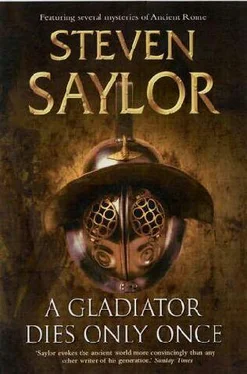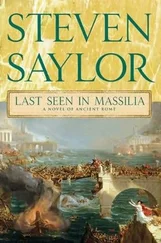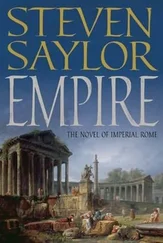Steven Saylor - A Gladiator Dies Only Once
Здесь есть возможность читать онлайн «Steven Saylor - A Gladiator Dies Only Once» весь текст электронной книги совершенно бесплатно (целиком полную версию без сокращений). В некоторых случаях можно слушать аудио, скачать через торрент в формате fb2 и присутствует краткое содержание. Жанр: Исторический детектив, на английском языке. Описание произведения, (предисловие) а так же отзывы посетителей доступны на портале библиотеки ЛибКат.
- Название:A Gladiator Dies Only Once
- Автор:
- Жанр:
- Год:неизвестен
- ISBN:нет данных
- Рейтинг книги:5 / 5. Голосов: 1
-
Избранное:Добавить в избранное
- Отзывы:
-
Ваша оценка:
- 100
- 1
- 2
- 3
- 4
- 5
A Gladiator Dies Only Once: краткое содержание, описание и аннотация
Предлагаем к чтению аннотацию, описание, краткое содержание или предисловие (зависит от того, что написал сам автор книги «A Gladiator Dies Only Once»). Если вы не нашли необходимую информацию о книге — напишите в комментариях, мы постараемся отыскать её.
A Gladiator Dies Only Once — читать онлайн бесплатно полную книгу (весь текст) целиком
Ниже представлен текст книги, разбитый по страницам. Система сохранения места последней прочитанной страницы, позволяет с удобством читать онлайн бесплатно книгу «A Gladiator Dies Only Once», без необходимости каждый раз заново искать на чём Вы остановились. Поставьте закладку, и сможете в любой момент перейти на страницу, на которой закончили чтение.
Интервал:
Закладка:
That night, after a very busy day, I slipped into bed beside Bethesda. Her mood seemed a bit cool, but she said nothing.
The silence stretched. "I suppose I owe you an apology," I finally said.
"For what?"
The best course, I decided, was to make light of my mistake. "It was foolish of me, really. Do you know, I almost suspected you of taking Eco's figurines."
"Really?" By the pale moonlight, I couldn't quite decipher the expression on her face. Was she angry? Amused? Unconcerned?
"Yes, I actually suspected you, Bethesda. But of course it wasn't
It was the cat, all along." The creature abruptly jumped onto the bed and crawled over both of us to settle between Bethesda and the wall, purring loudly.
"Yes, it was Bast who took the figurines," said Bethesda. She rolled away from me and laid her hand upon the cat, who responded with a purring that was almost a roar. "But how do you know that it wasn't I who put her up to it?"
For that, I had no answer.
THE WHITE FAWN
The old senator was a distant cousin of my friend Lucius Claudius, and the two had once been close. That was the only reason I agreed to see the man, as a favor to Lucius. When Lucius let it slip, on the way to the senator's house, that the affair had something to do with Sertorius, I clucked my tongue and almost turned back. I had a feeling even then that it would lead to no good. Call it a premonition, if you will; if you believe that such things as premonitions exist.
Senator Gaius Claudius's house was on the Aventine Hill, not the most fashionable district in Rome. Still, there are plenty of old patrician households tucked amid the cramped little shops and ugly new tenements that sprawl over the hill. The facade of the senator's house was humble, but that meant nothing; the houses of the Ro-man nobility are often unassuming, at least on the outside.
The doddering doorkeeper recognized Lucius (could there be two men in Rome with his beaming round face, untidy red hair, and dancing green eyes?) and escorted us at once to the atrium, where a fountain gurgled and splashed but did little to relieve the heat of a cloudless midsummer day. While we waited for our host to appear, Lucius and I strolled from corner to corner of the little square gar-den. On such a warm day, the various rooms facing the atrium all had their shutters thrown open.
"I take it that your cousin has fallen on hard times," I said to Lucius.
He pursed his lips. "Why do you assume that, Gordianus? I don't recall mentioning it."
"Observe the state of his house."
"It's a fine house. Gaius had it built when he was a young man and has lived here ever since."
"It seems rather sparsely decorated."
"You saw the busts of his noble ancestors lined up in their niches in the foyer," said Lucius, his nose tilting up. "What more ornamen-tation does the house of a patrician require?" Despite his genial temperament, Lucius sometimes could not help being a bit of a snob.
"But I think your cousin is a great lover of art, or used to be."
"Now why do you say that?"
"Observe the mosaic floor beneath our feet, with its intricate acanthus-leaf pattern. The workmanship is very fine. And note the wall paintings in some of the rooms around us. The various scenes are from the Iliad, I believe. Even from here I can see that they're works of very high quality."
Lucius raised an eyebrow. "Cousin Gaius does have good taste, I'll grant you that. But why do you assume he's fallen on hard times?"
"Because of the things that I don't see."
"Now, Gordianus, really! How can you walk into a house you've never entered before and declare that things are missing? I can see into the surrounding rooms as well as you, and they all look ade-quately furnished."
"Precisely; the furnishings are adequate. I should expect something more than that from the man who built this house and commissioned those wall paintings and mosaics. Where is the finely wrought furniture? Everything I see looks like the common stuff that anyone can buy ready-made down in the Street of the Woodworkers. Where are the paintings, the portable ones in frames, the portraits and bucolic scenes that are so fashionable nowadays?"
"What makes you think that cousin Gaius ever collected such works?"
"Because I can see the discolored rectangles on the wall where they used to hang! And surely a rather substantial statue once filled that empty spot atop the pedestal in the middle of the fountain. Let me guess: Diana with her bow, or perhaps a discus-thrower?"
"A rather good drunken Hercules, actually."
"Such valuables don't vanish from a patrician household without good reason. This house is like a bare cupboard, or a fine Roman matron without her jewelry. Where are the urns, the vases, the precious little things one expects to see in the house of a wealthy old senator? Auctioned off to pay the bill-collector, I presume. When did your cousin sell them?"
"Over the last few years," admitted Lucius with a sigh, "bit by bit. I suppose the mosaics and wall paintings would be gone by now as well, except that they're part of the house and can't be disposed of piecemeal. The Civil War was very hard on cousin Gaius."
"He backed the wrong side?"
"Quite the opposite! Gaius was a staunch supporter of Sulla. But his only son, who was my age, had married into a family that sided with Marius, and was contaminated by his wife's connections; he was beheaded when Sulla became dictator. He did leave an heir, however-Gaius's grandson, a boy named Mamercus, who is now not quite twenty. Gaius took custody of his grandson, but also had to assume his dead son's debts, which were crushing. Poor cousin
Gaius! The Civil War tore his family apart, took his only son, and left him virtually bankrupt."
I looked around. "The house itself looks valuable enough."
"I'm sure it is, but it's all that Gaius has left. The wealth has all fled. And so has young Mamercus, I fear."
"The grandson?"
"Gone to Spain! It's broken his grandfather's heart." "Spain? Ah, so that's why you mentioned Sertorius on the walk here…"
The Civil War had been over for six years. Marius had lost. Sulla had won, and had made himself dictator. He disposed of his enemies, reordered the state, and then retired, leaving his chosen successors in firm control of the senate and the magistracies. The Marians-those who had survived the proscriptions and still had their heads-were lying low. But in Spain, the last embers of resistance still smoldered in the person of Quintus Sertorius. The renegade general not only refused to surrender, but had declared himself to be the head of the legitimate Roman state. Disgruntled Marian military men and desperate anti-Sullan senators had fled from Rome to join Sertorius's government-in-exile. In addition to his own legions, Sertorius had succeeded in rallying the native population to his side. Altogether Sertorius and his forces in Spain constituted a considerable power that the Roman Senate could not ignore and had not yet been able to stamp out.
"Are you saying that young Mamercus has run off to join Sertorius?"
"So it appears," said Lucius, shaking his head. He leaned over to sniff a rose. "This smells very sweet!"
"So young Mamercus rejected his grandfather's Sullan politics and remained loyal to his mother's side of the family?"
"So it appears. Gaius is quite distraught. The folly of youth! There's no future for anyone who sides with Sertorius."
"But what future would the young man have if he'd stayed here in Rome with his grandfather? You say that Gaius is bankrupt."
"It's a question of loyalty, Gordianus, and family dignity." Lucius spoke carefully. I could see he was doing his patrician best not to sound condescending.
I shrugged. "Perhaps the boy feels he's being loyal to his dead father, by joining the last resistance to Sulla's faction. But I take your point, Lucius; it's a family tragedy, of a sort all too common these days. But what can your cousin want of me?"
Читать дальшеИнтервал:
Закладка:
Похожие книги на «A Gladiator Dies Only Once»
Представляем Вашему вниманию похожие книги на «A Gladiator Dies Only Once» списком для выбора. Мы отобрали схожую по названию и смыслу литературу в надежде предоставить читателям больше вариантов отыскать новые, интересные, ещё непрочитанные произведения.
Обсуждение, отзывы о книге «A Gladiator Dies Only Once» и просто собственные мнения читателей. Оставьте ваши комментарии, напишите, что Вы думаете о произведении, его смысле или главных героях. Укажите что конкретно понравилось, а что нет, и почему Вы так считаете.










